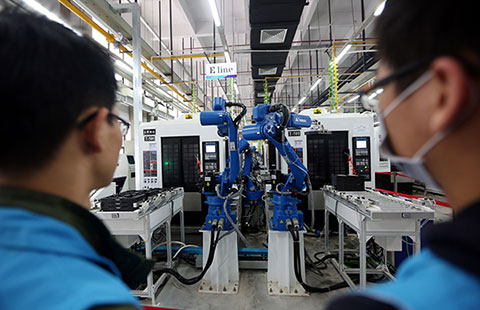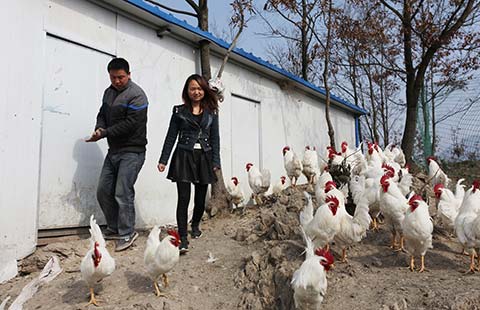Anhui farmers eye premium opportunities from prime porkers
By Zhu LiXin and Ma Chenguang (China Daily) Updated: 2016-03-25 08:13Consumers with the ability to pay a premium for organic food are encouraging pig breeders in the mountains of eastern China's Anhui province to embrace new business opportunities that are expected to boost their incomes.
On a mountain about 1,000 meters above sea level, breeder He Xianglin has tapped a spring with "really sweet" water that he funnels through bamboo pipes to his pig farm about 100 meters to the south.
Around 120 sows and dozens of newborn black piglets drink the spring water and eat cabbages and turnips He also grows on the mountain slope, irrigated by the spring and fertilized with pig manure.
While some companies are said to be harnessing the spring to bottle expensive water in Luohanshan village in Susong county, He has been using the water to breed black pigs in the village since 2008.
"Many people think I am foolish, because merely using the water to feed pigs seems a wasted opportunity," He said.
But He, 51, has a plan. He shifted at the end of last year to breeding a renowned local porker, the Anqing Liubai black pig, which is prized for its slow growth and tastiness. He expects to have 3,000 pigs in a year, and the return on his investment will take nearly as long.
"It will take at least 10 months for each hog to reach a weight of 90 kilograms, twice as long as breeding white pigs," He said.
The cost of raising the pigs is higher too-each kilogram of a pig's weight costs about 14 yuan ($2.14), mostly for feed-but so are the returns.
Since more Chinese consumers are buying high-end agricultural products, which are regarded as healthier alternatives, He expects his "totally organic" business to be quite profitable.
"Such pork products are often priced much higher than regular ones," He said.
Zhou Pei, a marketing executive for Xiandai Fine Breed Cultivation Co, provides the sows He raises at no cost and contracts to purchase the pigs once they've grown. "The best parts of the pig are priced at about 100 yuan per kilogram in the stores in cities," Zhou said.
Supported by agricultural authorities, the company based in the neighboring Wangjiang county has worked to protect the Liubai species since 2005, when it was in danger of dying out, and possesses a monopoly on the variety.
China is the largest pork consumer in the world, and most of the meat comes from white pigs. Industry insiders have warned that China's pig industry faces overcapacity, even as more pork has been imported in recent years.
- Northeastern provinces set for tech boost
- Boao forum calls for more support in infrastructure
- Chongqing, Zhoushan favorites as new free trade zones
- Import surge will boost service trade with developed countries
- Manufacturers in China urged to think smarter
- Top 10 most valuable Chinese brands in technology
- Confidence, patience needed in understanding Chinese economy: Aussie economist
- Global property to gain from increased market in 2016
















